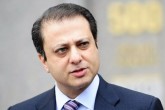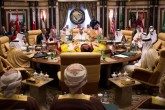Whenever we wish to comment on U.S. foreign policy or their approach regarding any type of global matter, we focus on the explanations the decision-makers give. What did U.S. President Barack Obama say? What announcement did the secretary of state make? What did speakers say in a press conference? Yes, by considering these, we analyze the U.S.’s global vision and approach.
Let’s say we are fine with this, but there are certain times when we say the U.S. thinks this way or the other based on a comment appearing in U.S. media. However, in order to truthfully understand the U.S.’s understanding of a threat, or who it sees as competitors and as enemies or the true nature of the global operations it leads, we need much more than this. And in this sense, the U.S. defense budget is a very useful resource.
Far beyond political discourse and the manipulation that comes with it, how much is set aside for what in the budget lays bare real policy.
A few days ago, the Pentagon presented its proposed budget for the new period to Congress. The most important factor revealing the U.S.’s understanding of global threats from defense spending in the new period is the share separated for “Overseas Contingency Operations.” In the new period, the Department of Defense is asking for $58.8 billion from Congress for these Overseas Contingency Operations in its budget. This is equal to about a tenth of the U.S. defense budget. The amount asked for from Congress in the fight against DAESH is $7.5 billion. Compared to the noise the U.S. has been making about the fight against DAESH, this is a small budget.
Some say this budget was $5 billion last year, and thus a 50 percent increase should be noted. But if we are going to speak about increases, we should be speaking about the resources set aside for the “European Reassurance Initiative,” formed after Russia’s invasion of Ukraine, in order to militarily support Europe, which more than quadrupled in the 2017 budget.
On the other hand, $41.7 billion from the defense budget are set aside for the ongoing operations in Afghanistan.
Let me now come to the main point I want to make, and it regards another attention-grabbing detail in the 2017 budget: From the $7.5 billion the U.S. Department of Defense is asking for in the context of the fight against DAESH, it foresees transferring $250 million of it to the Syrian Democratic Forces (SDF).
We all know that the main factor of the SDF is the People’s Protection Units (YPG). So the U.S. continues to give weapons aid to the YPG. It is unnecessary to go into the details of the aid. In the proposal text, everything is listed from the weapons to be given to the brands of vehicles to be purchased.
If we were to ask the Department of Defense, the U.S.’s main issues in the new period are: Facing rising China and Russia, addressing the increasing threat from North Korea, preventing Iran’s potentially destructive effect in the Middle East and to engage in operations against DAESH in various parts of the world – Iraq and Syria foremost among them.
Since fighting against DAESH is such an important strategic priority, why is the Obama administration attempting to lead this fight through a “dirty actor” like the YPG? Why does the Obama administration not care that Ankara regards this support as a “national security issue that directly affects internal peace?”
In the Obama administration’s strategy against DAESH, clearing Turkey’s border of DAESH is among the highest priorities alongside the rescue of Raqqa and Mosul.Many influential people in U.S. foreign policy have been saying that it will not be possible to lead an effective struggle against DAESH without receiving Turkey’s full support – and the Obama administration thinks that it has been unable to receive enough of this support.
On the other hand, the U.S. does not take Ankara’s threat perception seriously. Because the Turkish state regards the PKK as having ended the reconciliation process and begun the new wave of terror this past July in relation to the PKK’s desire to carry the status it has gained in Syria on to Turkey, from Ankara’s viewpoint, the fight against the PKK has moved to a new phase and is not limited just to Turkey’s borders.
In the last period, we saw some good signs: the U.S. began to take Ankara’s opinions into account about clearing Turkey’s borders of DAESH and working with the actual actors of the region. However, when we go into the details of the 2017 budget, the same shift is not actually on the table for the U.S.
After 2000, Turkish-U.S. relations were placed in a rational framework as never before. Maximizing mutual interests is undoubtedly the healthiest factor that will carry this relationship into the future. By attempting to surpass today’s hot problems with palliative measures and by aggrieving real partners, Obama is simply adding new mistakes to his political biography. And it will leave a bad legacy.
[Daily Sabah, April 22, 2016]
In this article
- Foreign Policy
- Opinion
- 2000
- 2016
- 2017
- Afghanistan
- China
- DAESH
- Daily Sabah
- Europe
- Fight against DAESH
- Fight Against Terror
- Global Actors | Local Actors
- Iraq
- Islamic Republic of Iran
- Kurdistan Workers' Party Terrorist Organization (PKK)
- Middle East
- People's Protection Units (YPG)
- PKK - YPG - SDF - PYD - YPJ - SDG - HBDH - HPG - KCK - PJAK - TAK - YBŞ
- Russia
- Syria
- Syrian Civil War
- Syrian Conflict
- Syrian Crisis
- Syrian Democratic Forces (SDF)
- Terror
- Ukraine
- United States (US)
- US Foreign Policy
- US Media
- US President



